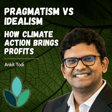
Ep. 20: Alexander Saverys - Environmental Impact and Decarbonization in Maritime Innovation
“The human being has shown that we can solve big environmental problems. And one of the drivers on the CO2 and decarbonization is I truly believe that human innovation, human energy to solve issues can lead to good solutions.”
Are the high seas the key to solving our planet’s environmental crisis?
As the world searches for sustainable solutions to combat climate change, few industries face the same challenges—and opportunities—as maritime shipping. The shipping sector has long been a cornerstone of global commerce, but its environmental impact is undeniable. What if the ships that connect the world could also lead the charge toward a greener, cleaner future?
Explore the transformative potential of hydrogen and ammonia as alternative fuels, the regulatory hurdles shaping the industry, and the groundbreaking innovations that could redefine maritime shipping. From cutting-edge technology to ambitious sustainability goals, learn about these bold ideas that could change the way we move goods across the globe.
Our guest, Alexander Saverys, CEO of CMB Tech, brings a unique perspective to this critical issue. With a family legacy in shipbuilding dating back to 1829, Alexander merges deep tradition with forward-thinking innovation. Under his leadership, CMB Tech is driving the decarbonization of shipping operations, positioning the company—and the industry—as leaders in the fight against climate change.
Alexander Saverys: https://www.linkedin.com/in/alexander-saverys-586bb942/
Explore these valuable resources to further your journey in regenerative design:
Discover more about Regenerative design at Paulownia Landscape Architects. https://www.paulownia-la.com/.
Dive into the Twelve Laws of Nature and unlock the secrets of harmonizing with our planet at https://www.12lawsofnature.com/.
Fulfill your garden aspirations with expert guidance from the Garden of Your Dreams masterclass at https://www.gardenofyourdreams.com/.
Ready to take actionable steps towards your dream garden? Book a complimentary 30-minute training session with Matthieu for immediate results: https://calendly.com/garden-of-your-dreams.















